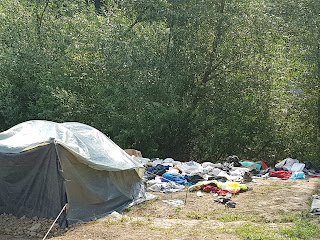SHORT DRAFT OF NEEDS ASSESSTMENT
FOR REFUGEE EMERGENCIES (NARA)
IN REFUGEE CAMP
“TRNOVI”, VELIKA KLADUŠA, BOSNIAN FRONTIER
Dimitar Anakiev, dr.med,
spec.GlobalHealth
Velika Kladuša,
BIH, 29.07.2018
0.Newspaper titles from
Unsko Krainske novine KRAJINA, issue 27.07. 2018:
-Local government
wants to help Federal government
in solving migrant crisis (page 3)
-New refuge center to be
created in Bosanski Petrovac? (page 3)
-Interview with migrant
from Pakistan (page 4)
-Report from Hotel Sadra
(Cazin) about vulnerable families (page 8)
-Protest against
unresolving
migrants situation in Sarajevo (page 9)
-Muslim
religious leader Kavezović visited
migrants in Velika Kladuša, reportage (page 10)
-Mobile children care for
migrants in Bihać (page 16)
1.Humanitarian
Context:
According to one of
camp coordinators the number of refugees in Bosnian Frontier
(Bosanska krajina, area of municipality Bihać, Cazin and Kladuša,
part od Canton Una-Sana, Federation B&H) is about 1000.
On the other side, media reports mention 3000-5000 migrants in Bosnia
and Herzegovina. The most critical situation is in refugee camp
„Trnovi“, Velika Kladuša, with about 350 refugees, mostly male
settled in improvised tents in the marshes
by Kladušnica river. Families from Velika Kladuša and Bihać are
settled in Hotel Sedra, Cazin (approximately
100 people).
2.Shelter
Refugees
reached Velika Kladuša in March 2018. In the beginning they were
settled in public parks. On May 17 they were moved by the decision of
mayor of Velika Kladuša to the marshes by Kladušnica river. At the
moment the ground is dry but any rain change it and all tents are
full of water. The camp site is about 8 hectares,
what is too small for the number of refugees. There is no solid
facilites,
only tents improvised by the plastic & nylon. Day and night
temperature differences in the tents are high, vector control does
not exist (Bosnia
is an endemic area for Lyme borreliosis).
3.Water,
sanitation and hygiene (WASH)
The
municipality extended electrics and drinking water line to the camp
site. Also five (5) chemical toilets are installed. Nothing of those
reaches Sphere standards for humanitarian situation:
--According
to the number of refugees (350) settled in Velika Kladuša already 5
months the minimum number of toilets that is required is seventeen
(17). That means 11,76% only of reaching standards but it is even
worse because the type of toilets are not adequate (small tank, needs
for frequent emptying that does not function at all)
--The
number of showers are only two (2), required
minimum standard is twenty
five (25) for 350 people in humanitarian context, that is only 8% of
needed according to Sphere standards. The situation makes people
nervous and causes fighting among them.
--There
are thee (3) tapes in the camp (adequate number!) but it is used for
all: personal hygiene, drinking water, „shower“, laundry
washing (no laundry
facilities in camp) so it is always crowded.
4.Health
Care
Health
care is based in patrol system of MSF mobile medical unit plus local
EMS units and Bihać hospital secondary.
Actually
primary health care does not exist including public health control.
Prevalence
of visiting doctor is very high: 25% (Comparison: in Ljubljana asylum
facilities it is 6-8%, in Zagreb 7%, in refugee camp Domiz (Iraq)
with 40.000 refugees it is only 0.5%). The main figures:
--Mortality:
available official figuers
show 12 people drowned dead in river Kupa/Kolpa (nearby
Croatian-Slovenian border), one (1) death from knife stabbing in
camp-fight, one (1) deatah
from illness (pneumonia & encephalitis)
--Morbidity:
66% all kinds of skin infection, 30% injuries (result of both:
Croatian police violence after attempts of illegal crossing border
and internal camp fights and violence), 15% scabies also some number
of stomach
problem,
diarrhea,
tonsillo-pharyngitis,
and flu. Also, some number of refugees complain to headache,
sleeplessness
and psychological problems.
5.Conclusion:
Inadequate
site, very low hygiene level and violence makes health
hazard situation extremely high, especially
during the summer. High percent of prevalence of visiting doctor
shows that health situation is already bad. According
to health hazard risks and available health figures refugee camp
Trnovi needs permanent 5 days stationary primary health care with 6-8
hours health control and help (doctor plus nurse) / correction of
WASH situation immediately.
























